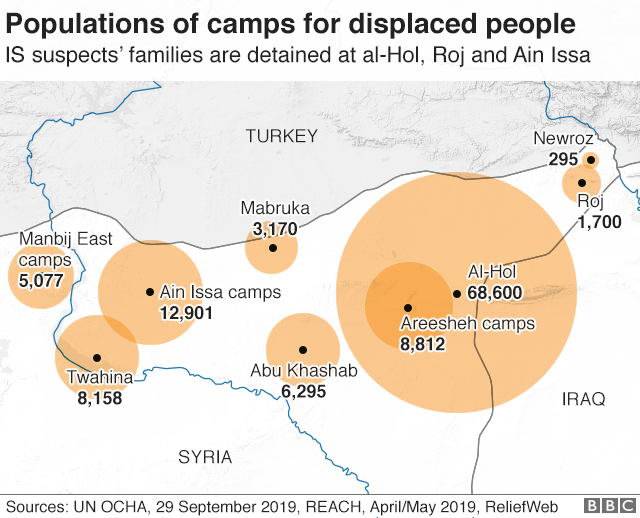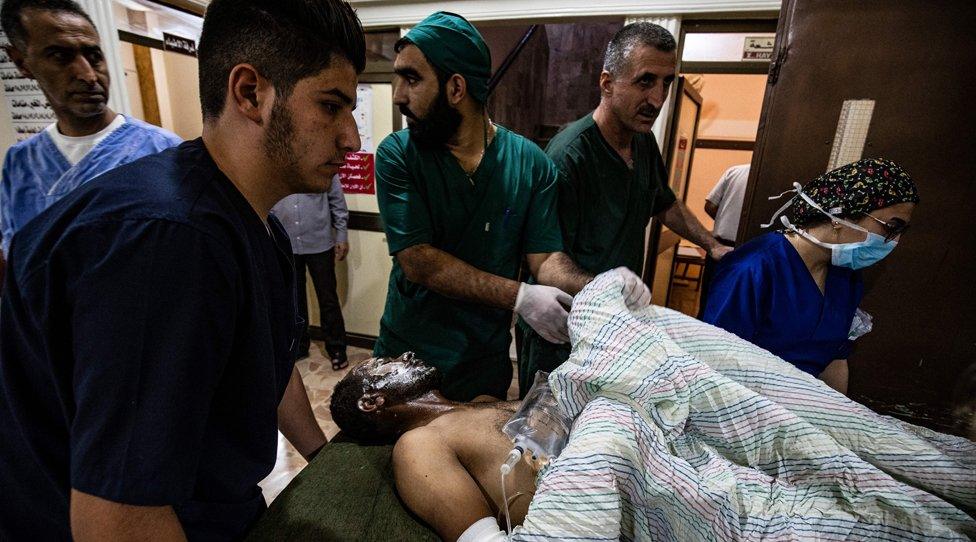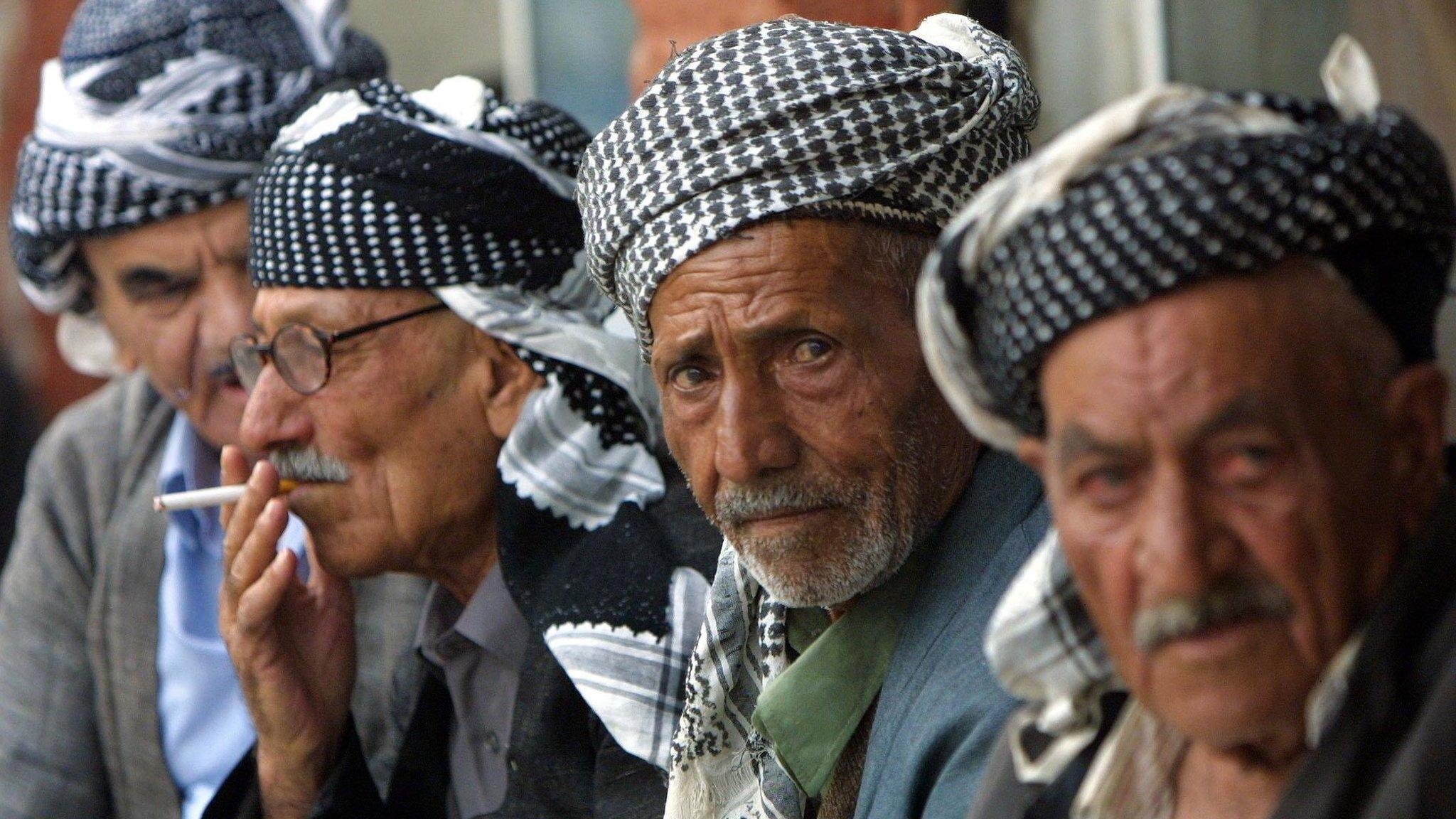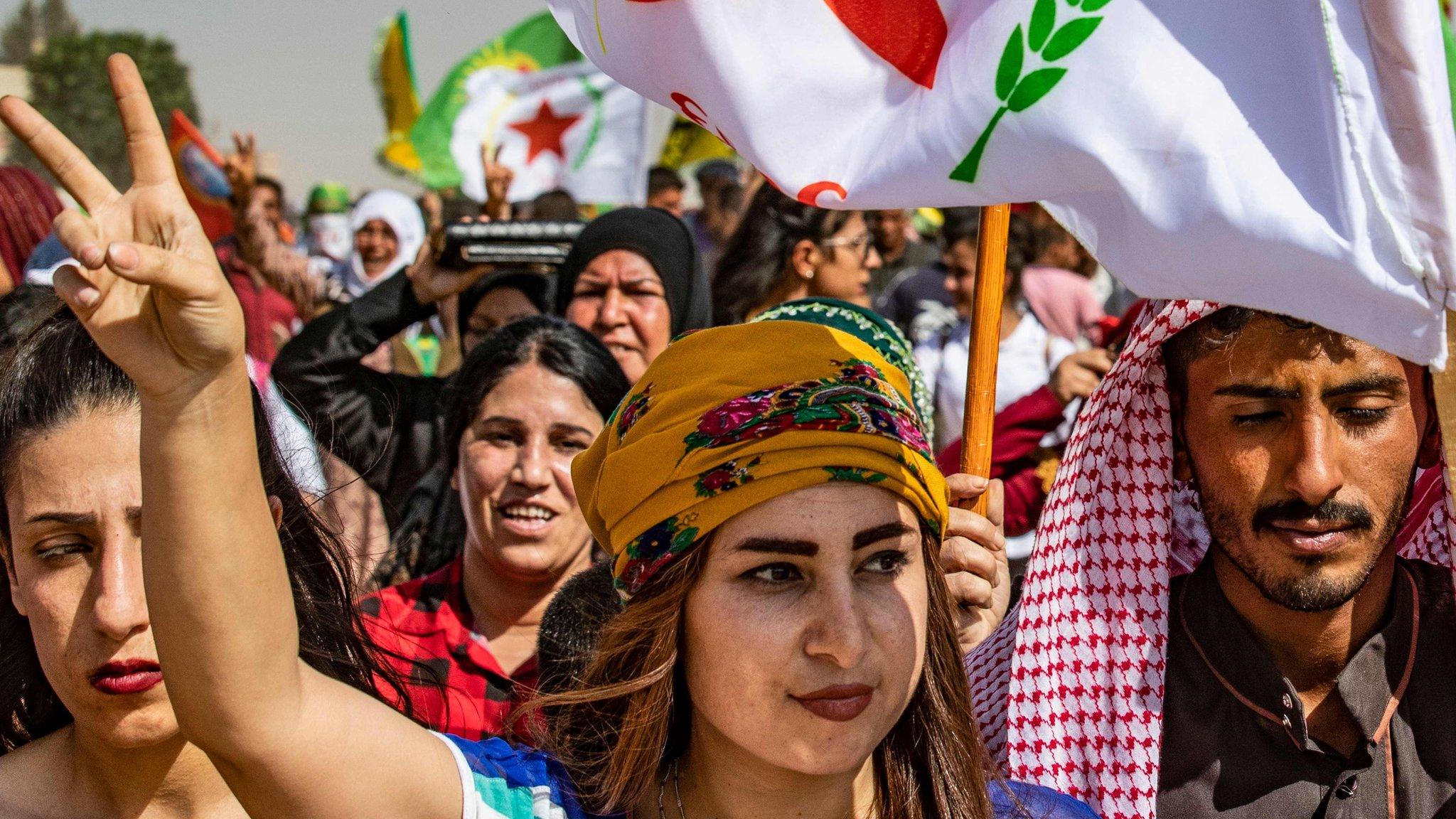Turkey-Syria offensive: The people caught in the middle
- Published

Tens of thousands of civilians have fled fighting in northern Syria and are in desperate need of humanitarian assistance, the UN has said.
As Turkey continues its cross-border military operation against Kurdish-led forces in the region, the UN Security Council has said it is "very concerned" about the situation deteriorating further.
Dozens of civilians and fighters have been killed since the start of the offensive, launched after US troops - previously allied to the Kurds - pulled back from the border last week. The Kurds have now turned to the Syrian army for help.
What's the situation like for ordinary people?
Thousands are on the move
Turkish troops and allied Syrian rebels launched the operation last week to push a Syrian Kurdish militia away from the border. Turkey wants to create a "safe zone" where Syrian refugees - many currently in Turkey - could be resettled.
Air strikes, artillery and ground attacks have killed civilians on both sides of the border. The dead include children.


France's President, Emmanuel Macron, warned on Sunday that the violence risked creating an "unbearable humanitarian situation".
At least 160,000 civilians have fled their homes, external, the UN Office for the Co-ordination of Humanitarian Affairs (OCHA) says, with reports that 1,000 people have headed over the border to Iraq.
Unicef estimates that almost 70,000 children have been displaced.
Up to 400,000 people may need help in the coming days and weeks, aid agencies say.
On Tuesday, many international NGOs and their international staff were forced to depart the area because of the deteriorating situation, the Kurdish Red Crescent said.
Aid agencies are finding it particularly difficult to provide assistance in the towns of Ras al-Ain, Ain Issa and Tal Abyad because of the hostilities.
UN Secretary General António Guterres has demanded "sustained, unimpeded and safe humanitarian access to civilians in need" to allow the organisation and its humanitarian partners to carry out their work.
The World Food Programme (WFP) has said the humanitarian situation is "dire" as people flee their homes or temporary camps with nothing.
"We need everything. We need food, the children need food. We are 15 people and my grandchildren are orphans," said Thalja Modhi, who left Ras al-Ain for the city of Hassakeh.
Most people have fled Ras al-Ain and Tal Abyad, according to the OCHA, but others have been evacuated from nearby camps set up for people already displaced by the Syrian civil war and the battle against the Islamic State (IS) group.

"We are trying to reach as many people as possible and are despatching emergency food packages as tens of thousands are fleeing their areas every day," Corinne Fleischer, the WFP's country director in Syria, said on Monday.
Before the Turkish operation began, northern Syria had acted as a place of refuge for people fleeing violence in other parts of the country. Tens of thousands of people were living in camps across the region.
But the violence has threatened that safety and many are now being displaced for a second time.
The OCHA has said there are also "grave concerns" about people in Tal Tamer, which is hosting many newly displaced people, as military operations approach. The town's hospital - one of the few still operational - has received hundreds of casualties in the past few days.
Most of those fleeing have sought shelter with relatives, friends or with local communities. Others have headed for a number of "collective shelters" across the region, where people are offered help before moving onto more secure accommodation.
The UN has overseen the evacuation of two camps, Ain Issa and Mabruka, moving people to camps further south. However, some families remain at Mabruka.
Relatives of IS fighters have also fled
Before the Turkish offensive, tens of thousands of relatives of suspected IS militants were being detained by Kurdish-led forces at Ain Issa and two other camp - al-Hol and Roj.

Kurdish officials said the shelling of the area around the Ain Issa camps led to the escape of almost 800 relatives of IS members over the weekend. However, the Syrian Observatory for Human Rights, a UK-based monitoring group, said the number of people who fled was 100. It not known where they have gone.
Some 12,000 men suspected of being IS militants - Syrians, Iraqis and other foreigners - are being held at seven prisons run by Kurdish-led forces.
The UN Security Council has said it is deeply concerned that the ongoing military action could lead to the "dispersion of terrorists", such as those associated with IS.
Hospitals and infrastructure have been damaged
A number of hospitals and clinics in northern Syrian towns have closed as a result of the violence.
The national hospital in Ras al-Ain, as well as the national hospital and two health centres in Tal Abyad, are out of action, according to the WHO.
Field hospitals at some camps have also had their medical services affected.

A shortage of health workers - themselves displaced by the conflict - has made the situation worse, the WHO says.
Some of the affected areas are also reporting shortages of food, water and electricity.
Damage to the Allouk water pumping station at Ras al-Ain, the main water source for most of Hassakeh province, has increased the risk of outbreaks of infectious diseases.
The UN says it is negotiating with Turkey to gain access to the station to continue repairs.
Significant parts of the M4 motorway, which is the main east-west transport route running parallel to the border, has also been cut off.
- Published15 October 2019

- Published23 October 2019

- Published11 October 2019